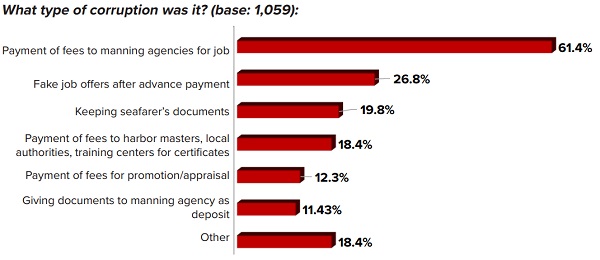Report: Charging recruitment fees to seafarers must stop
The Institute for Human Rights and Business (IHRB) and the Sustainable Shipping Initiative (SSI) have published a study on Seafarers and Recruitment Fees, which surveyed almost 5,000 seafarers.
The research has found that from almost 5,000 responses by seafarers, almost 40% experienced at least one form of unethical or illegal action in violation of international standards relating to worker rights either during the recruitment process or while working at sea. Of those, 70% reported having been asked or made to pay fees to manning agents in order to secure a job or finding job offers were fake after making payment.
The report also uses data collected in a survey undertaken by online maritime recruitment platform TURTLE of the 85,000 seafarers on its books, between 22.09.2022 to 21.02.2023. The survey was designed by TURTLE in conjunction with the Maritime Anti-Corruption Network (MACN) and covers a range of worker related issues. This briefing focuses on responses around the payment of recruitment fees to manning agents for jobs (or fake jobs).
What are Recruitment Fees?
Recruitment fees are generally defined as “any fees or costs incurred in the recruitment process in order for workers to secure employment or placement, regardless of the manner, timing or location of their imposition or collection
| Read More: EMSA: Seafarer Statistics in the EU 2021 |

According to the report, not only is it prohibited to charge recruitment fees for a job under the Maritime Labour Convention, but the subsequent debt burden on seafarers can be a significant factor in the risk of forced labour. With 90% of world trade carried by sea, there is almost no company immune from needing to carry out due diligence on this issue – from the shipping industry itself to commodity companies and highstreet brands.
"No worker should have to pay for their own job. But the reality remains that far too many seafarers continue to confront the illegal practice of recruitment fees", said Frances House, Senior Advisor at IHRB
Key findings
The report suggests that in order to minimise the risk of forced labour among seafarers, the shipping industry and its customers must work collectively to tackle this issue of illegal recruitment fees being charged to seafarers and seek an industry-wide shift to the ‘Employer Pays Principle’ whereby no worker is paying the costs of their own recruitment.
Furthermore, there needs to be applied leadership and action from all stakeholders to end this corrupt and illegal practice:
- Shipping companies need to ensure that seafarers employed on board their ships have not been charged recruitment fees to secure their work contracts.
- Customers of shipping companies – including charterers, commodity companies and traders, and container cargo owners – must carry out human rights due diligence in line with the UN Guiding Principles on Business and Human Rights across their value chains – this includes their shipping suppliers.
- As the payment of recruitment fees is prohibited under the Maritime Labour Convention, port state authorities must investigate any reports of the charging of recruitment fees.
- Home states (where manning agencies are based) must ensure that manning agencies do not charge fees for jobs, and importantly must enact and enforce penalties for such practices.
- There needs to be greater awareness of the illegality of the charging of recruitment fees, among seafarers, national authorities, ship operators and cargo owners.
- There also need to be effective mechanisms to penalise offending agencies and for remedy for seafarers who have paid illegal recruitment fees, including possibly, reimbursement by employers of fees already paid.
- Seafarers need to know how and where to report such practices.
Increasing legal requirements (e.g. Norwegian Transparency Act, German Supply Chain Act, France’s loi de vigilance, Modern Slavery Acts in UK, Australia and elsewhere, forthcoming EU Corporate Sustainability Due Diligence legislation) will, to a greater or lesser extent, place the legal responsibility on all companies to report on what steps they are taking to mitigate human rights risks in their operations and in their supply chains, and shipping is no exception.
| Read More: Philippines approves bill to protect seafarers’ rights |
"The charging of recruitment fees to seafarers is expressly prohibited under the Maritime Labour Convention – if it is as widespread as this research indicates, then governments and the shipping industry must take urgent and determined action to stamp out this illegal practice", said Mark Dickinson, General Secretary of seafarer union Nautilus International.
"Seafarers are instrumental in escalating and sharing data on integrity challenges; and the success of many companies’ Anti-Bribery and Corruption programs lies in the engagement and empowerment of seafarers", added the The Maritime Anti-Corruption Network (MACN).
Questions and answers on corruption


Source: Safety4sea
| Read Here | |
 |
|








































